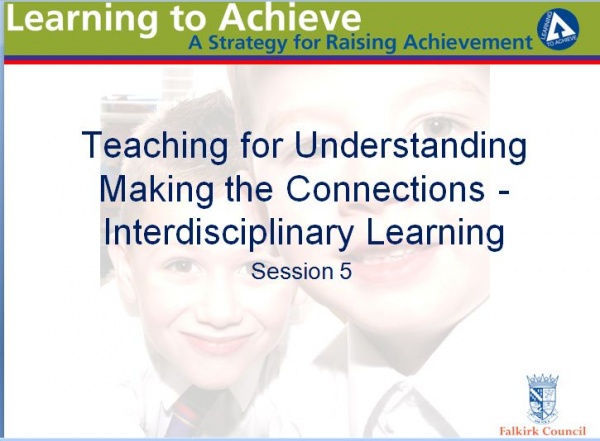 Yvonne McBlain from Falkirk’s Curriculum Support team has now created a page for each of our Teaching for Deep Learning sessions here in Glow. Five of our secondary schools have used, or are beginning to use these sessions as content for their Teacher Learning Communities and working groups. Nineteen of our primary schools have already accessed at least one of the sessions – sometimes as a whole staff, and other times within smaller collegiate groups. We have 18 TfDL (Teaching for Deep Learning) facilitators who are being trained to deliver the sessions – some want to do this in their own schools only, whereas others are happy to make themselves available across the authority where needed. Four of our secondary schools are modelling a whole range of Donaldson Review recommendations regarding professional learning in their use of the programme. Most have recruited teachers interested in becoming facilitators within their schools, who then attend an information session (Click to view) on the programme from Yvonne. Each school is then deciding how they can enable staff to identify which sessions should be priorities for their professional learning this session. Once these decisions are made, teacher learning communities interested in the same sessions can be formed. The same model of distributed leadership (facilitators) and professional autonomy through self-evaluation is being taken forward by some of our primary schools “in house” too. Feedback from participants of sessions so far confirms the value of the programme as one of the ways in which we can move Falkirk schools from Good to Great.
Yvonne McBlain from Falkirk’s Curriculum Support team has now created a page for each of our Teaching for Deep Learning sessions here in Glow. Five of our secondary schools have used, or are beginning to use these sessions as content for their Teacher Learning Communities and working groups. Nineteen of our primary schools have already accessed at least one of the sessions – sometimes as a whole staff, and other times within smaller collegiate groups. We have 18 TfDL (Teaching for Deep Learning) facilitators who are being trained to deliver the sessions – some want to do this in their own schools only, whereas others are happy to make themselves available across the authority where needed. Four of our secondary schools are modelling a whole range of Donaldson Review recommendations regarding professional learning in their use of the programme. Most have recruited teachers interested in becoming facilitators within their schools, who then attend an information session (Click to view) on the programme from Yvonne. Each school is then deciding how they can enable staff to identify which sessions should be priorities for their professional learning this session. Once these decisions are made, teacher learning communities interested in the same sessions can be formed. The same model of distributed leadership (facilitators) and professional autonomy through self-evaluation is being taken forward by some of our primary schools “in house” too. Feedback from participants of sessions so far confirms the value of the programme as one of the ways in which we can move Falkirk schools from Good to Great.
Author: Y. McBlain
Introduction to the Storyline Approach
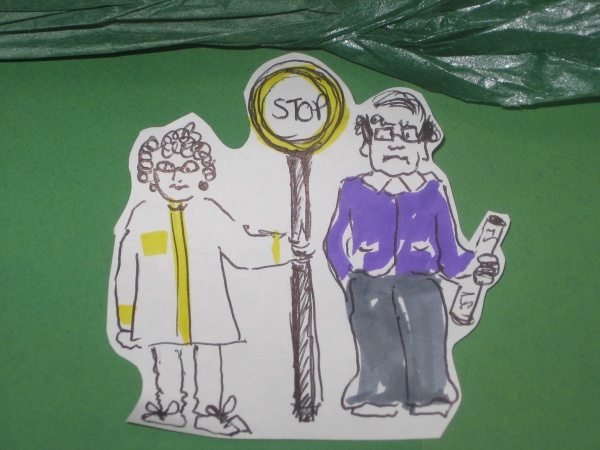 On 12th September 2013, Yvonne McBlain of Falkirk’s Curriculum Support Team delivered introductory training on the use of the Storyline Approach. The practitioners attending the training listened to a short presentation setting out the philosophy and structure of storyline methodology, but the bulk of the twilight session was about actually “doing” storyline. This involved them creating a setting for their storyline – in this case a new community (see below) called Camelon Court . They then worked collaboratively to create 3 families for this new community. As usual in storyline, the creation of these characters was enjoyable, engaging, and the resulting verbal introductions to the families was entertaining too. Click here to see the biography format used by the groups to create these families. Already we can see potential relationships and narratives emerging! Look out for part two next week!
On 12th September 2013, Yvonne McBlain of Falkirk’s Curriculum Support Team delivered introductory training on the use of the Storyline Approach. The practitioners attending the training listened to a short presentation setting out the philosophy and structure of storyline methodology, but the bulk of the twilight session was about actually “doing” storyline. This involved them creating a setting for their storyline – in this case a new community (see below) called Camelon Court . They then worked collaboratively to create 3 families for this new community. As usual in storyline, the creation of these characters was enjoyable, engaging, and the resulting verbal introductions to the families was entertaining too. Click here to see the biography format used by the groups to create these families. Already we can see potential relationships and narratives emerging! Look out for part two next week!
You may want to explore more Falkirk storyline work in our Storyline Glow group, or see what is happening nationally and internationally with the Storyline approach at http://www.storyline-scotland.com/
Pupils start making their version of Learning to Achieve
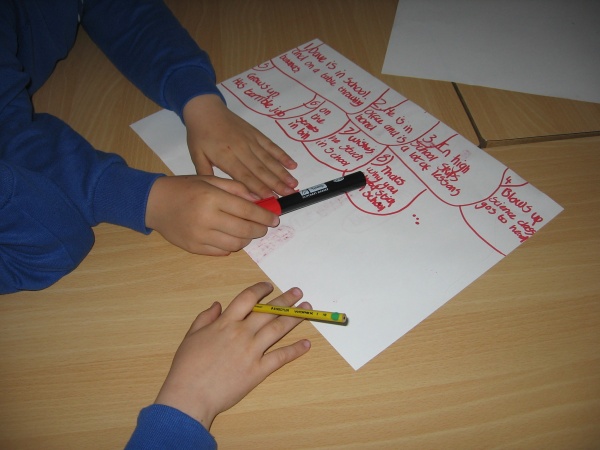 Yvonne McBlain from the Curriculum Support team is working with groups of pupils and their teachers to create the pupil version of Learning to Achieve, Falkirk’s education policy. Christine Snedden and Yvonne have been working with pupils and pupil council members for a while, to create the draft version of this policy. Groups of teachers and their pupils have now volunteered to turn this text document into something digital like a video or animation. John Chalmers primary 5 class at Grange Primary brainstormed ways that they could bring each bullet point to life. Click here to see some of their initial ideas – most groups thought about making drama performances which could be filmed. The animation club run by Sarah Ritchie at Bonnybridge Primary spent most of an afternoon coming up with ideas for animations which could bring each bullet point to life. Click on the photos to take a closer look at their initial ideas. Yvonne was very impressed by the way all of the pupils began this task – they quickly understood the message and content of the policy text in the document and made very clever judgements about how best to get their message across to fellow pupils. When these ideas are turned into a digital multi-media policy, the senior pupil council have suggested that this is shared with all pupils and staff working in education services at a launch assembly in every school, sometime in October.
Yvonne McBlain from the Curriculum Support team is working with groups of pupils and their teachers to create the pupil version of Learning to Achieve, Falkirk’s education policy. Christine Snedden and Yvonne have been working with pupils and pupil council members for a while, to create the draft version of this policy. Groups of teachers and their pupils have now volunteered to turn this text document into something digital like a video or animation. John Chalmers primary 5 class at Grange Primary brainstormed ways that they could bring each bullet point to life. Click here to see some of their initial ideas – most groups thought about making drama performances which could be filmed. The animation club run by Sarah Ritchie at Bonnybridge Primary spent most of an afternoon coming up with ideas for animations which could bring each bullet point to life. Click on the photos to take a closer look at their initial ideas. Yvonne was very impressed by the way all of the pupils began this task – they quickly understood the message and content of the policy text in the document and made very clever judgements about how best to get their message across to fellow pupils. When these ideas are turned into a digital multi-media policy, the senior pupil council have suggested that this is shared with all pupils and staff working in education services at a launch assembly in every school, sometime in October.
Celebrating Learning about the Bean Geese
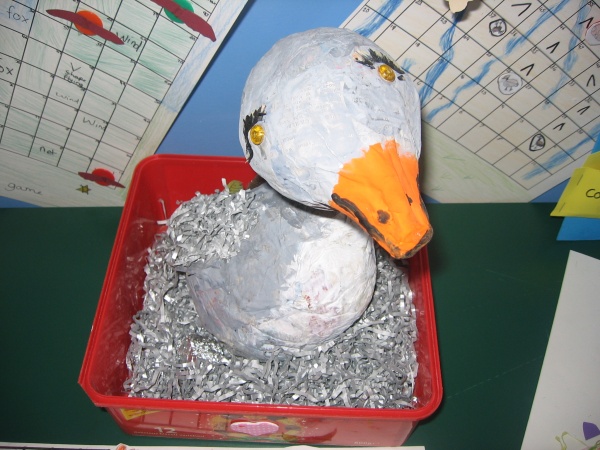 Yvonne McBlain from Falkirk Council Curriculum Support Team attended a great celebration of interdisciplinary learning at Slamannan Primary School on 29th May. Primary 4/5 and primary 5/6 have been part of some ground-breaking science work in partnership with the RSPB and Scottish Natural Heritage. They have been studying a species of goose which visits the fields around their school during the winter. The Slamannan plateau is the ONLY place in Scotland that these geese occur, and scientists have been trying for 20 years to discover where they go when they leave Slamannan. Partners from RSPB worked with Mrs Murray and Mr Findlay and their pupils to find out how to observe, capture, monitor and then track the geese as they left in springtime.
Yvonne McBlain from Falkirk Council Curriculum Support Team attended a great celebration of interdisciplinary learning at Slamannan Primary School on 29th May. Primary 4/5 and primary 5/6 have been part of some ground-breaking science work in partnership with the RSPB and Scottish Natural Heritage. They have been studying a species of goose which visits the fields around their school during the winter. The Slamannan plateau is the ONLY place in Scotland that these geese occur, and scientists have been trying for 20 years to discover where they go when they leave Slamannan. Partners from RSPB worked with Mrs Murray and Mr Findlay and their pupils to find out how to observe, capture, monitor and then track the geese as they left in springtime.
The pupils shared their valuable interdisciplinary learning with an invited audience via a power point presentation and received Certificates of Distinction in their learning from SNH and RSPB. They were presented with a class set of binoculars so that they can continue their observations of the Bean geese next winter. The pupils were excitied to discover that RSPB and SNH will work with them again next session and follow up on the pupils’ suggestion that they communicate with people who live where the Bean geese go for the summer. See pictures of the Bean Goose Project display below, and visit the pupils’ blog to find out where they tracked the geese down to.
Christopher in primary 6 said that his favourite part of the project was tracking the geese, and pupils in primary 4/5 said they enjoyed “All of it!”
Tapestry Masterclass – Making Thinking Visible
Yvonne McBlain was joined by a range of colleagues from Falkirk Education Service at the Tapestry Masterclass : Making Thinking Visible on 16th May. Mark Church was one of the main speakers – he is part of Project Zero at Harvard University. He suggested that schools should be learning cultures for adults, just as classrooms are for children. He posed a range of questions such as: Why does classroom and school culture matter to the learning that happens in this place? Click here to read an extract from “Making Thinking Visible : How to Promote Engagement, Understanding, and Independence for All Learners” by Mark Church, Ron Ritchhart & Karin Morrison, 2011. Chris McIlroy then delivered a presentation entitled “Seeing what they mean” (click here to view his power point notes). Click here to view thinking routine resources produced by Visible Thinking of Harvard Project Zero. Unfortunately, Yvonne couldn’t stay to hear Anne Pearson, Graeme Logan and Frank Lennon in the afternoon but it would be great to hear comments below from those who were there and can fill in the gaps.
Airth Primary Staff use Teaching for Deep Learning Session 5
 Yvonne McBlain, Support Teacher effective learning and teaching, facilitated a collegiate session with teachers at Airth Primary School using session 5 from the Falkirk Teaching for Deep Learning Programme. This session uses an interdisciplinary learning quiz to help evaluate existing practice. Staff involved said it was useful to “discuss how we effectively plan and deliver interdisciplinary learning, as well as highlighting our next steps.” In addition, the session “defined the different types of interdisciplinary learning and the need to make it obvious what skills were being used in type 1 and type 2”. Yvonne was able to adjust the content and format of this session so that staff could consider how to track the knowledge, understanding and skills being developed in the interdisciplinary work done at Airth PS. The session resulted in identification of some initial specific tasks for the staff as a whole, as well as individual next steps for teachers which included:
Yvonne McBlain, Support Teacher effective learning and teaching, facilitated a collegiate session with teachers at Airth Primary School using session 5 from the Falkirk Teaching for Deep Learning Programme. This session uses an interdisciplinary learning quiz to help evaluate existing practice. Staff involved said it was useful to “discuss how we effectively plan and deliver interdisciplinary learning, as well as highlighting our next steps.” In addition, the session “defined the different types of interdisciplinary learning and the need to make it obvious what skills were being used in type 1 and type 2”. Yvonne was able to adjust the content and format of this session so that staff could consider how to track the knowledge, understanding and skills being developed in the interdisciplinary work done at Airth PS. The session resulted in identification of some initial specific tasks for the staff as a whole, as well as individual next steps for teachers which included:
Think more about type 1 interdisciplinary learning and its place in my class
Look for type 1 IDL in the experiences and outcomes
Continue to encourage children to make connections between curricular areas.
Click to take a look at the power point notes for Session 5 , and here to take a look at the whole Falkirk Teaching for Deep Learning Programme in Glow.
Global Storylines Roadshow in Falkirk
Yvonne McBlain and Anne Hutchison from Falkirk Curriculum Support team have worked with Diana Ellis and Marie-Jeanne McNaughton to organise a Global Storylines Roadshow event in Camelon Education Centre between 3.30pm and 5.15pm on 30th May 2013. This event is for primary and nursery practitioners who may be interested in joining a potential Falkirk cohort of teachers accessing this high quality professional learning next session. Diana and Marie-Jeanne will share the content and format of this valuable global citizenship training, as well as the impact it has had on teachers and pupils. A number of teachers in our schools have already expressed a firm interest in being part of this Falkirk cohort. This event is designed to ensure that everyone has a chance to find out more about what is involved. Click here to read the descriptor for this course – applications should be made through your CPD co-ordinator in the usual way. You may also want to visit the Global Storylines website . Here are the thoughts of a teacher and a pupil who have taken part in tha Global Storyline project:
“My confidence in teaching these current issues has really increased and I can now use what I’ve learned to develop Global Citizenship right across different curriculuar areas and incorporate the drama techniques in all the different activities we use.” Principal Teacher
“It makes you think about it, because unless you look at something, it’s quite hard to imagine how people feel in real life, you can’t just step out of drama and go back into real life. When they’re in that position iit puts things into perspective.” 11-year-old pupil.
These testimonials express some of the benefits of applying storyline teaching strategies to progress pupil knowledge and understanding of global citizenship issues.
Falkirk Teaching for Deep Learning Programme
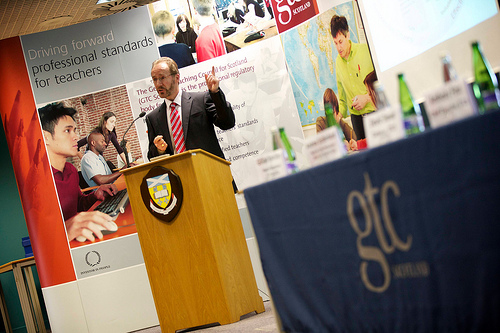 Falkirk’s Teaching for Deep Learning programme is now available to support school-based professional learning. This programme consists of 19 sessions focused on aspects of effective teaching which are essential to the promotion of deep learning in our pupils. The sessions are active, intellectually stimulating and designed to be experienced by collaborative groups of practitioners such as Teacher Learning Communities.
Falkirk’s Teaching for Deep Learning programme is now available to support school-based professional learning. This programme consists of 19 sessions focused on aspects of effective teaching which are essential to the promotion of deep learning in our pupils. The sessions are active, intellectually stimulating and designed to be experienced by collaborative groups of practitioners such as Teacher Learning Communities.
“Teaching Scotland’s Future” said that the “foundation of successful education lie in the quality of teachers and their leadership. High quality people achieve high quality outcomes for children.” Without a doubt what it means to be a teacher is being re-conceptualised. Enabling our teachers to operate as enquiring practitioners and encouraging their self efficacy is at the heart of this programme.
Trialling in a range of establishments this session has demonstrated how flexible the content of the programme is, and that there are varied ways in which it can be used. View these variations in the document at the end of this post and consider if any are useful to you as you self-evaluate and create your school improvement plans.
The programme was created by Susan Dyer, Head teacher at Bankier Primary School, Gillian Campbell, PE teacher from Braes High School and Sharon Wallace and Yvonne McBlain from our Curriculum Support Team. Colleagues across our service have helped the team revise and improve the programme and we have a team of 16 facilitators currently training to deliver it.
I am confident that the programme aligns with the recommendations of the Donaldson Review, the new suite of GTCS standards & Professional Update and our own Employee Review and Development process. I recommend it to you.
To discuss how this programme might support your School Improvement Planning in more detail, contact yvonne.mcblain@falkirk.gov.uk . Click here to view a summary of programme sessions.
Exploring elements of planning with Denny Early Years Cluster
 On Tuesday 16th April Yvonne McBlain from the Curriculum Support Team worked with 27 early years practitioners from the Denny cluster. She facilitated a workshop which explored how practitioners were integrating essential elements of assessment into their planning of interdisciplinary learning. The workshop gave these practitoners an opportunity to work with their establishment colleagues on 2 “challenges”. These challenges were designed to enable collaborative and individual self-evaluation of planning effective connected learning. They also supported identification of the most relevant next steps for partricipants. The session was designed to generate questions as well as providing access and guidance on next steps. Participants said that the session was “useful” “informative” “made you think” and was “well-designed and enjoyable”. Here is a selection of next steps identified by participants:
On Tuesday 16th April Yvonne McBlain from the Curriculum Support Team worked with 27 early years practitioners from the Denny cluster. She facilitated a workshop which explored how practitioners were integrating essential elements of assessment into their planning of interdisciplinary learning. The workshop gave these practitoners an opportunity to work with their establishment colleagues on 2 “challenges”. These challenges were designed to enable collaborative and individual self-evaluation of planning effective connected learning. They also supported identification of the most relevant next steps for partricipants. The session was designed to generate questions as well as providing access and guidance on next steps. Participants said that the session was “useful” “informative” “made you think” and was “well-designed and enjoyable”. Here is a selection of next steps identified by participants:
Further conversations with colleagues around planning
Think more about what our success criteria will be while planning – which should make evidence and assessment more relevant
Develop team’s ability to identify appropriate learning intentions and success criteria
Review approach to planning
Share with other staff (higher classes in school)







